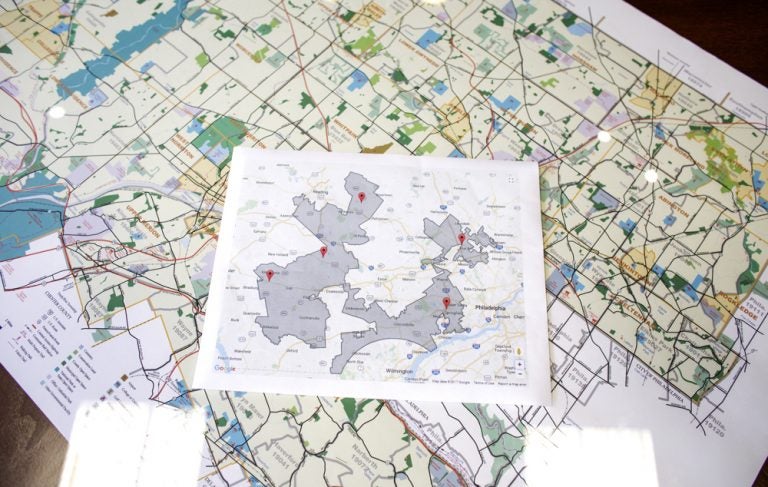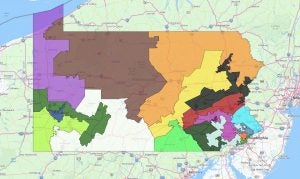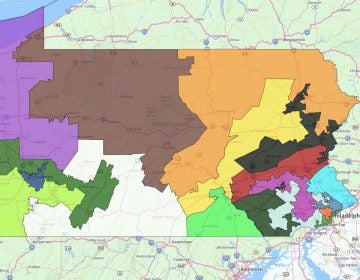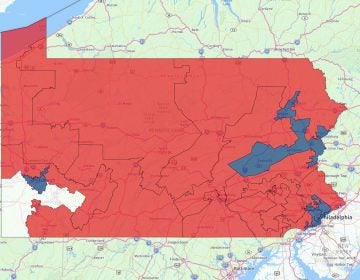Federal judges uphold Pennsylvania’s congressional map in gerrymandering case
Attorneys for the plaintiffs say they plan to appeal the decision to the U.S. Supreme Court.

A map of the 7th congressional district as drawn in 2011. The district incorporates most of Delaware County and portions of Chester, Montgomery, Berks and Lancaster Counties. (Dan Gleiter/pennlive.com)
A panel of federal judges upheld Pennsylvania’s congressional district map as constitutional in a 2-1 split decision on Wednesday.
In the majority decision, Chief Judge D. Brooks Smith ruled that the plaintiffs’ claim is a political question inappropriate for the courts.
“The structural change Plaintiffs seek must come from the political branches or the political process itself, not the courts,” wrote Smith.
In the case, a group of about 20 Pennsylvania voters from around the state claimed lawmakers intentionally rigged the map to favor Republicans over Democrats in an effort they believe violated the U.S. Constitution.
Their argument hinged on a novel interpretation of the Elections Clause, which grants state legislatures the power to set rules regarding the time, place, and manner of congressional elections.
Attorneys for the plaintiffs argued that the clause limits state government, though, to procedural rules, and prevents it from interfering with or manipulating election outcomes.
The court disagreed with the plaintiffs’ legal theory, and said that it’s the courts that should not interfere.
“When federal courts step in, however, they do so at the risk of muddying the waters — potentially providing state legislatures with enough cover to argue that their hands are tied by the courts and that they are not responsible for a controversial map,” wrote Smith.
Attorneys for the plaintiffs say they plan to appeal the decision to the U.S. Supreme Court.
The ruling comes on the heels of a unanimous decision out of North Carolina, where a panel of three judges went in the other direction, striking down the state’s congressional map as an unconstitutional partisan gerrymander.
“We filed this suit because we believe the Elections Clause prohibits gerrymandering,” said plaintiffs’ attorney Alice Ballard in a written statement. “In North Carolina three judges said it did. In Pennsylvania two judges said it did not — and third agreed with us. Four agree with our legal position on the Elections Clause – two judges do not. Only the Supreme Court can make the final decision.”
Pennsylvania’s map is often cited as one of the most egregious examples of partisan gerrymandering in the United States. During the case proceedings, two high-level Republican staffers admitted that the map was created using partisan data — including past elections results down to the voting precinct level. But they said that data was just one of many factors considered, including equal population in each district, protecting incumbents, and following the Voting Rights Act.
The actual data that was used to create the map was revealed in the case, obtained through court order. Questions remain, though, exactly how it was used to shape the districts.
Throughout the case, attorneys representing House Speaker Michael Turzai (R-Allegheny) and Senate President Pro Tempore Joe Scarnati (R-Jefferson) argued that there’s a long precedent of political considerations being used during the redistricting process.
They called the plaintiffs’ theory a “tortured interpretation of the Elections Clause” in a post-trial brief.
“It reaffirms what we’ve said from the beginning,” said Steve Miskin, spokesman for House Republicans. “That these maps we put together were constitutional.”
In a written statement, Senator Scarnati said the court should have stayed the Pennsylvania case until the U.S. Supreme Court decides Gill v. Whitford, a similar challenge from Wisconsin.
“The 2011 Pennsylvania Congressional districts map has been determined to be constitutional by both Federal and State judges, which serves to further strengthen my view that the plaintiffs should abandon their costly legal actions…,” said Scarnati.
Another battle over the state’s congressional district will continue next week, when the Pennsylvania Supreme Court will hear arguments in a similar case.
WHYY is your source for fact-based, in-depth journalism and information. As a nonprofit organization, we rely on financial support from readers like you. Please give today.







